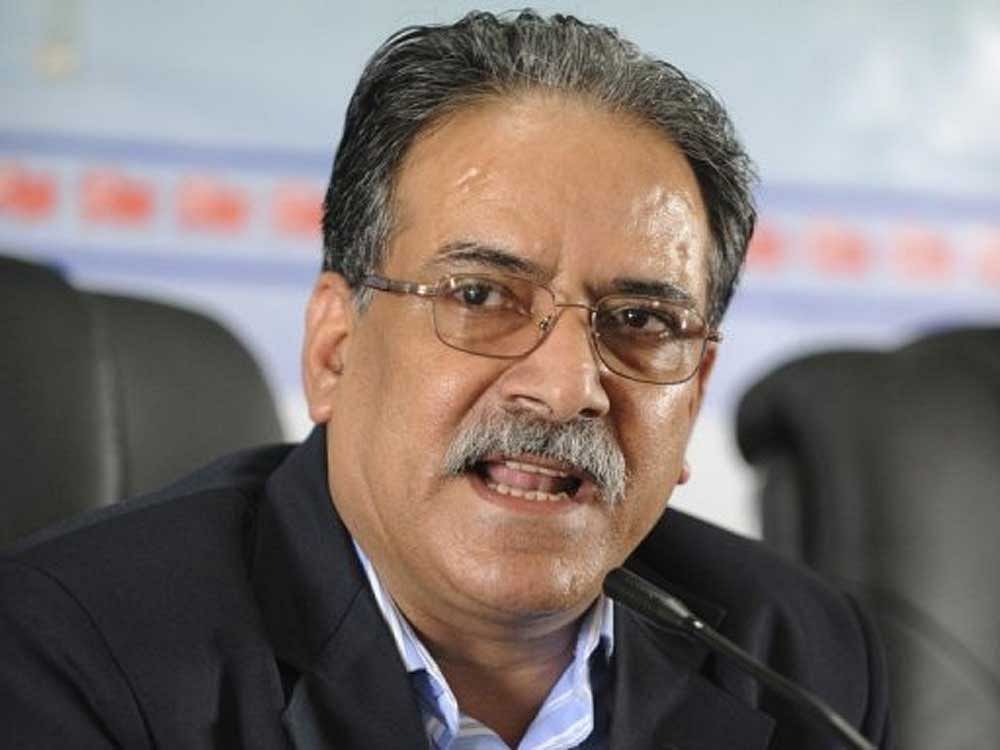Nepal PM Prachanda resigns
Last Updated IST

Pushpa Kamal Dahal 'Prachanda'. DH file photo.
Nepal Prime Minister Pushpa Kamal Dahal 'Prachanda' today resigned after a brief stint of nine months, honouring a power-sharing understanding with the ruling coalition partner Nepali Congress to hand over the country's leadership to the largest party in Parliament.
His resignation has cleared way for his former political rival and Nepali Congress president Sher Bahadur Deuba, who is expected to take over as the prime minister.
Prachanda announced his resignation while addressing the nation in a live telecast from his office at Singha Durbar here. He said that he would go to the President's Office to submit his resignation today itself.
"I announce my resignation from the post of the prime minister today," the 62-year-old Maoist leader said as he highlighted the achievements made by his government.
The prime minister said that he has followed a balanced foreign policy and succeeded in normalising relations with the neighbours as well as building confidence.
It was Prachanda's second stint as the Prime Minister. He was elected as the 39th prime minister of Nepal after forging alliance with the Nepali Congress on August 3, 2016.
He is the only communist leader to become the Prime Minister of the country twice. During his first tenure as the prime minister from 2008 to 2009, Prachanda was not on good terms with India.
However, during his second tenure, Prachanda had chosen India as his first overseas destination rather than China.
Indo-Nepal ties, which were strained during Prachanda's predecessor K P Oli's regime, also improved under the Maoist leader's second stint.
Prachanda's successor Deuba's appointment is likely to be confirmed in a parliamentary vote within the next 10 days.
The Nepali Congress - the largest party in Parliament - and constituents of the United Democratic Madhesi Front, the Federal Alliance and some other parties had helped Prachanda in securing 363 votes in the 595-member House to form the government comfortably in 2016.
During the formation of the government, the Chairman of CPN (Maoist Centre) had reached an understanding with Deuba that he would step down as prime minister and hand over the leadership to the Nepali Congress after nine months.
The pact was to run the government on a rotational basis until elections to the parliament are held in February 2018.
Prachanda was to hold office till local polls are held and remaining two elections – provincial and central - were to be conducted under Deuba.
Millions of Nepalese on May 14 voted in the first local- level polls in two decades as the Himalayan nation took a crucial step towards cementing democracy amid political turmoil.
Local-level elections could not be held after 1997 largely as a result of the decade-long Maoist insurgency that claimed more than 16,000 lives in Nepal.
The elections should be held in every five years but due to the political instability, they were halted since May 1997.
Prachanda, who led the Maoists during the armed struggle from 1996 to 2006, is credited with transforming the rebel movement into a political party after a 2006 peace deal.
His resignation has cleared way for his former political rival and Nepali Congress president Sher Bahadur Deuba, who is expected to take over as the prime minister.
Prachanda announced his resignation while addressing the nation in a live telecast from his office at Singha Durbar here. He said that he would go to the President's Office to submit his resignation today itself.
"I announce my resignation from the post of the prime minister today," the 62-year-old Maoist leader said as he highlighted the achievements made by his government.
The prime minister said that he has followed a balanced foreign policy and succeeded in normalising relations with the neighbours as well as building confidence.
It was Prachanda's second stint as the Prime Minister. He was elected as the 39th prime minister of Nepal after forging alliance with the Nepali Congress on August 3, 2016.
He is the only communist leader to become the Prime Minister of the country twice. During his first tenure as the prime minister from 2008 to 2009, Prachanda was not on good terms with India.
However, during his second tenure, Prachanda had chosen India as his first overseas destination rather than China.
Indo-Nepal ties, which were strained during Prachanda's predecessor K P Oli's regime, also improved under the Maoist leader's second stint.
Prachanda's successor Deuba's appointment is likely to be confirmed in a parliamentary vote within the next 10 days.
The Nepali Congress - the largest party in Parliament - and constituents of the United Democratic Madhesi Front, the Federal Alliance and some other parties had helped Prachanda in securing 363 votes in the 595-member House to form the government comfortably in 2016.
During the formation of the government, the Chairman of CPN (Maoist Centre) had reached an understanding with Deuba that he would step down as prime minister and hand over the leadership to the Nepali Congress after nine months.
The pact was to run the government on a rotational basis until elections to the parliament are held in February 2018.
Prachanda was to hold office till local polls are held and remaining two elections – provincial and central - were to be conducted under Deuba.
Millions of Nepalese on May 14 voted in the first local- level polls in two decades as the Himalayan nation took a crucial step towards cementing democracy amid political turmoil.
Local-level elections could not be held after 1997 largely as a result of the decade-long Maoist insurgency that claimed more than 16,000 lives in Nepal.
The elections should be held in every five years but due to the political instability, they were halted since May 1997.
Prachanda, who led the Maoists during the armed struggle from 1996 to 2006, is credited with transforming the rebel movement into a political party after a 2006 peace deal.